Let me start by saying that this trip almost didn’t happen. A visa application I started in early November was still unresolved a day before FOSDEM. Without my passport, I had to cancel my flight. But with just a few hours to go, something changed.
On January 30th, I received a notification that my passport had reached Abuja, and DHL would take at least 24 hours to get it to Port Harcourt. Long story short? I wrote a letter authorising a friend in Abuja to pick up the passport and check the visa approval status. The outcome was positive! The next morning (January 31st), I was on the first flight to Abuja. After a first flight, a long layover and a second flight, I finally reached Brussels on Saturday morning — just in time to rush straight to FOSDEM.
Amidst all this chaos, I missed the first conference I had planned to attend before FOSDEM — CHAOSScon25.
First-Time FOSDEM Experience
This was my first time attending FOSDEM in person. Last year, I had only given a talk online — my first international talk. Being there in person this year was an awesome experience, and I can’t thank OLS enough for making it happen.
Organiser
Meeting long-time organisers of the Open Research Devroom was a learning experience. I was exposed to the challenges of scheduling online talks across different time zones and learned how to use Pretalx for reviewing abstracts and proposals.
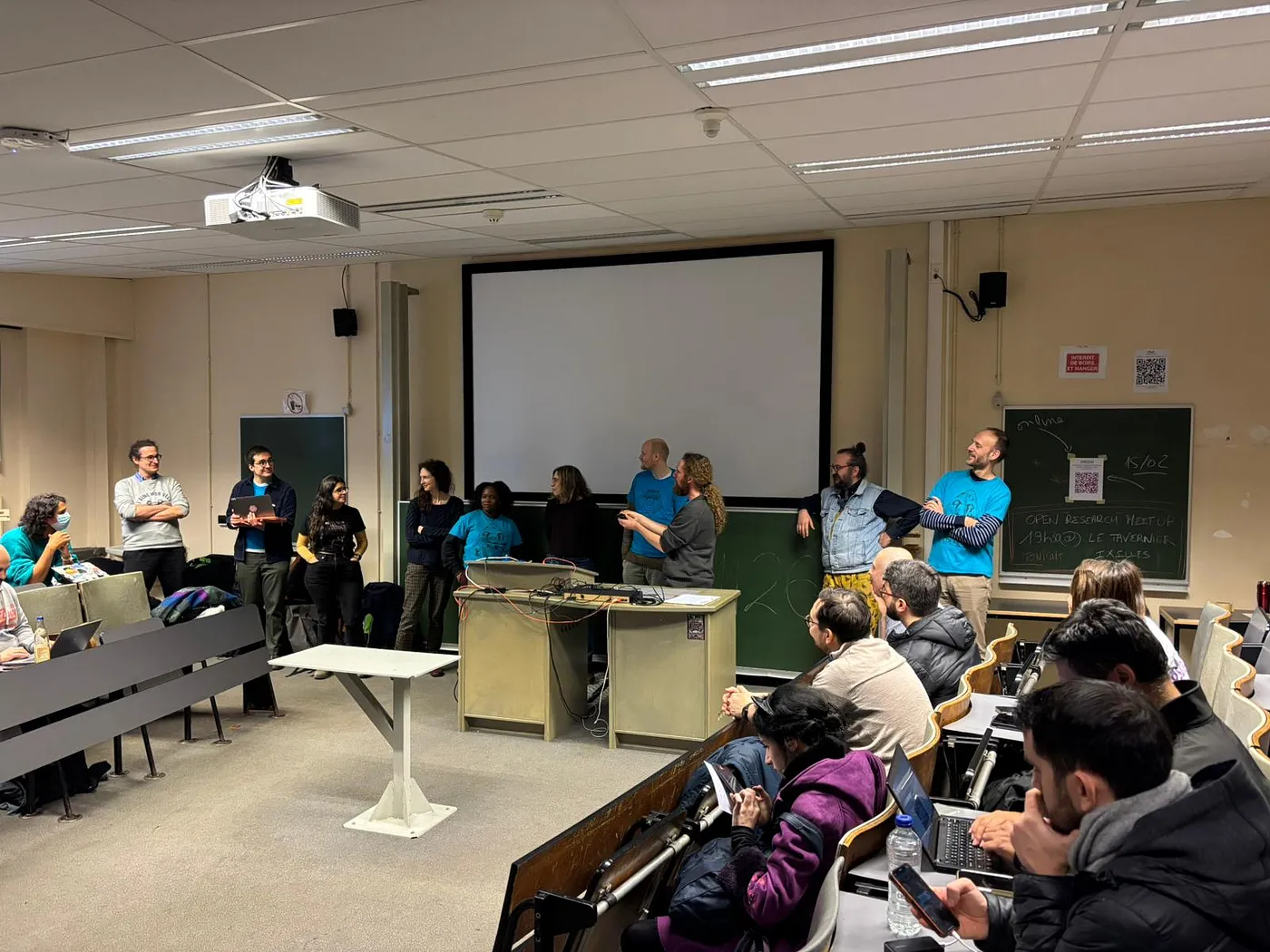
One of my small but exciting contributions was adding the schedule to the website and enhancing it with a little CSS for better aesthetics and UX.
I also got to experience the subtle power of keeping speakers on schedule — holding up signs to let them know they had “x minutes left.” So much power!
Speaker
I gave a lightning talk on Pre-seeds, sharing early insights from our ongoing survey on underrepresented groups in research. We have a small team working on this, with a roadmap in place and a survey aimed at understanding what people want in a course like Pre-seeds. This was a great opportunity to showcase our progress and gather feedback.
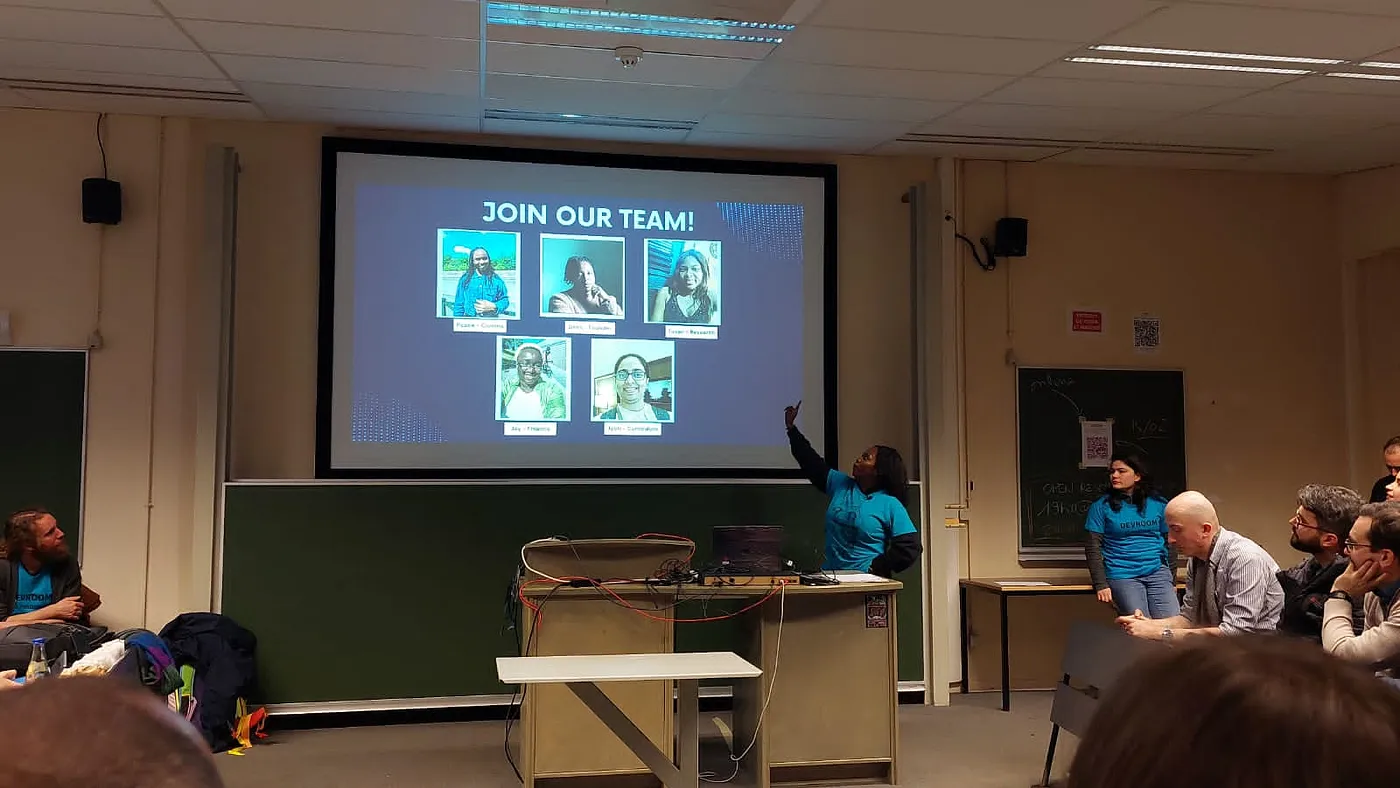
Attendee
Day 1: Open Research Devroom
Some of the standout talks were:
- “Applying the ‘Do No Harm’ Principle to Open Source Practices and Technology” —
This talk drew inspiration from the Hippocratic Oath, where doctors swear to do no harm. It made me reflect on how, while we can’t prevent all harm in open source, we should strive to minimise intentional and avoidable harm. Dr. Malvika Sharan discussed how openness — our invitation for people to use, remix, and build on our work — can sometimes perpetuate harm. This thought-provoking session initiated deeper discussions about the ethical aspects of open science and responsible research practices.
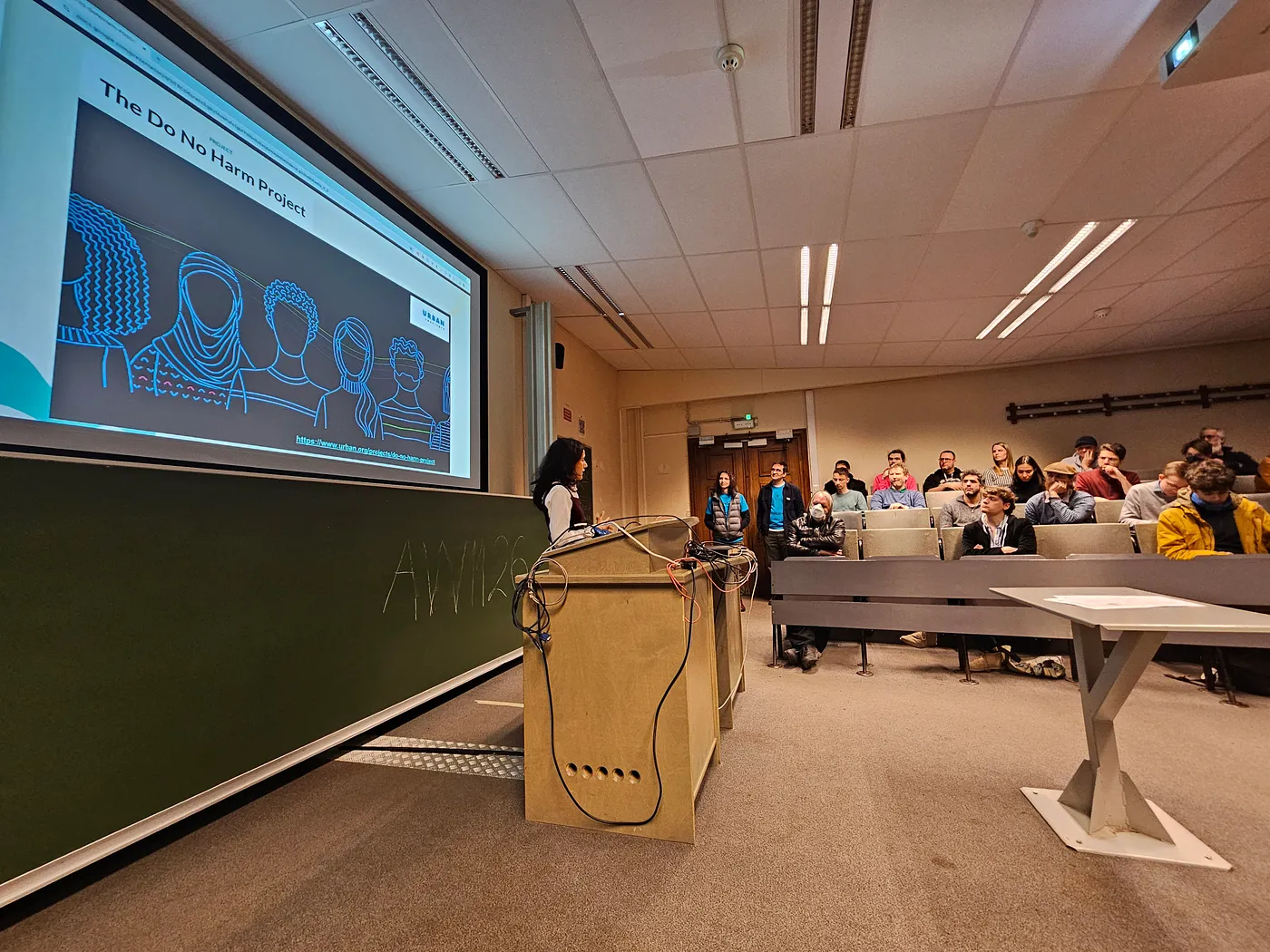
- JOSSCast: Experimenting with Storytelling in Open Research —
Abigail Cabunoc Mayes and Arfon Smith spoke about their experiment with JOSSCast, a podcast designed to connect researchers, developers, and contributors through storytelling. They shared insights into what worked, what didn’t, and how podcasts can strengthen open research by engaging both technical and non-technical audiences. This session reinforced the power of storytelling in science communication and community-building.
Day 2: Funders Devroom
The highlights of my day were:
- “Storytelling, Networking, and Strategy: Three Keys to Successful Fundraising” by Amy Parker. This was easily my favorite session of the day. She broke down fundraising success into three key components: “the right ask (Storytelling) to the right person (Networking) at the right time (Strategy).” It was a brilliant talk on how to align these elements to secure funding.
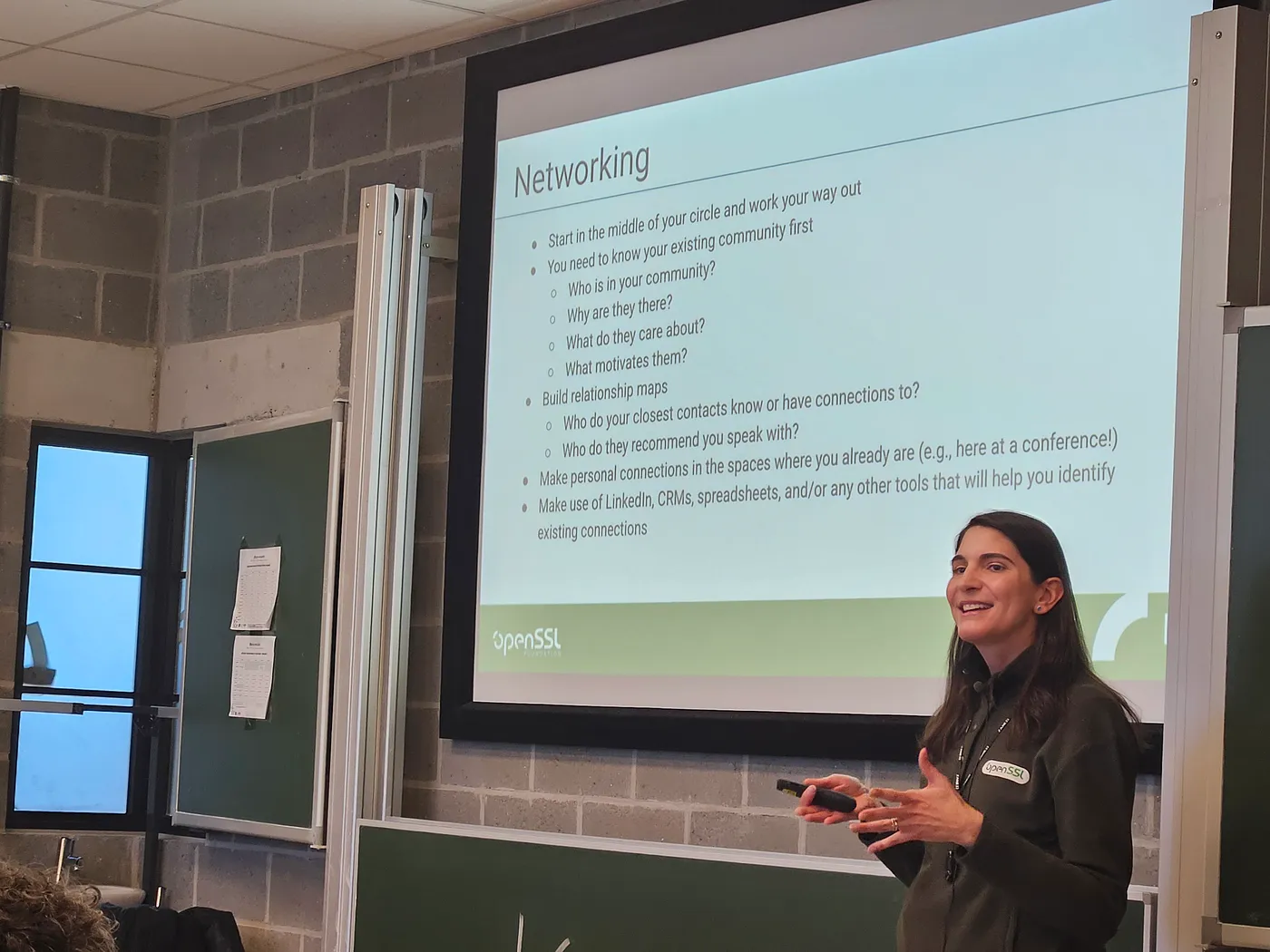
-
Funders Devroom organisers AMA Session I was looking forward to Emmy Tsang’s talk on “Funding the FOSS Ecosystem”, but unfortunately, it was canceled due to her Eurostar delay. That was heartbreaking. However, the Devroom organisers salvaged the situation with an impromptu Ask Me Anything (AMA) session.
-
“Small Seeds — Why Funding New Ideas Matters”
This talk by by Marie Kreil and Marie-Lena Wiese (of Prototype Fund) struck a personal chord. They emphasised the importance of supporting young and novel ideas, which resonated with me as I work on Pre-seeds.
- “When is it Right to Say No to Funding?” by Karen Sandler.
It was a surprising but essential session. In a room with people trying to secure funding, this talk took a different approach — outlining cases where declining funding is the better choice, such as misaligned values, unreasonable workloads, or funders attempting to rewrite the purpose of a project.
The FOSDEM Maze
The sheer size of FOSDEM was overwhelming — multiple buildings, endless rooms, and long queues outside popular Devrooms. Trying to navigate was a bit daunting for a first timer, and I imagine this might be the case even for people who are already familiar with how FOSDEM works.
However, one of the best things about FOSDEM is that all talks are recorded. So, when the chaos becomes too much, you can take a break, grab some waffles, and catch up later.
Also, I can’t not mention ‘sticker heaven’ — There was an entire section dedicated to stickers, and I wanted one (or six) of everything. I need more laptops to put these on!
The Friendships
One of the best parts of FOSDEM was reconnecting with friends and meeting new people:
-
My friend and SSI brother, David Luiz, gave me the most amazing hug — thank you!
-
Sara Petti and I snuck into the Funders Devroom, sat through talks, and chatted about life.
-
Malvika Sharan treated me to lunch on both days, unaware of how much that “small” gesture meant to me. Thank you for the book!
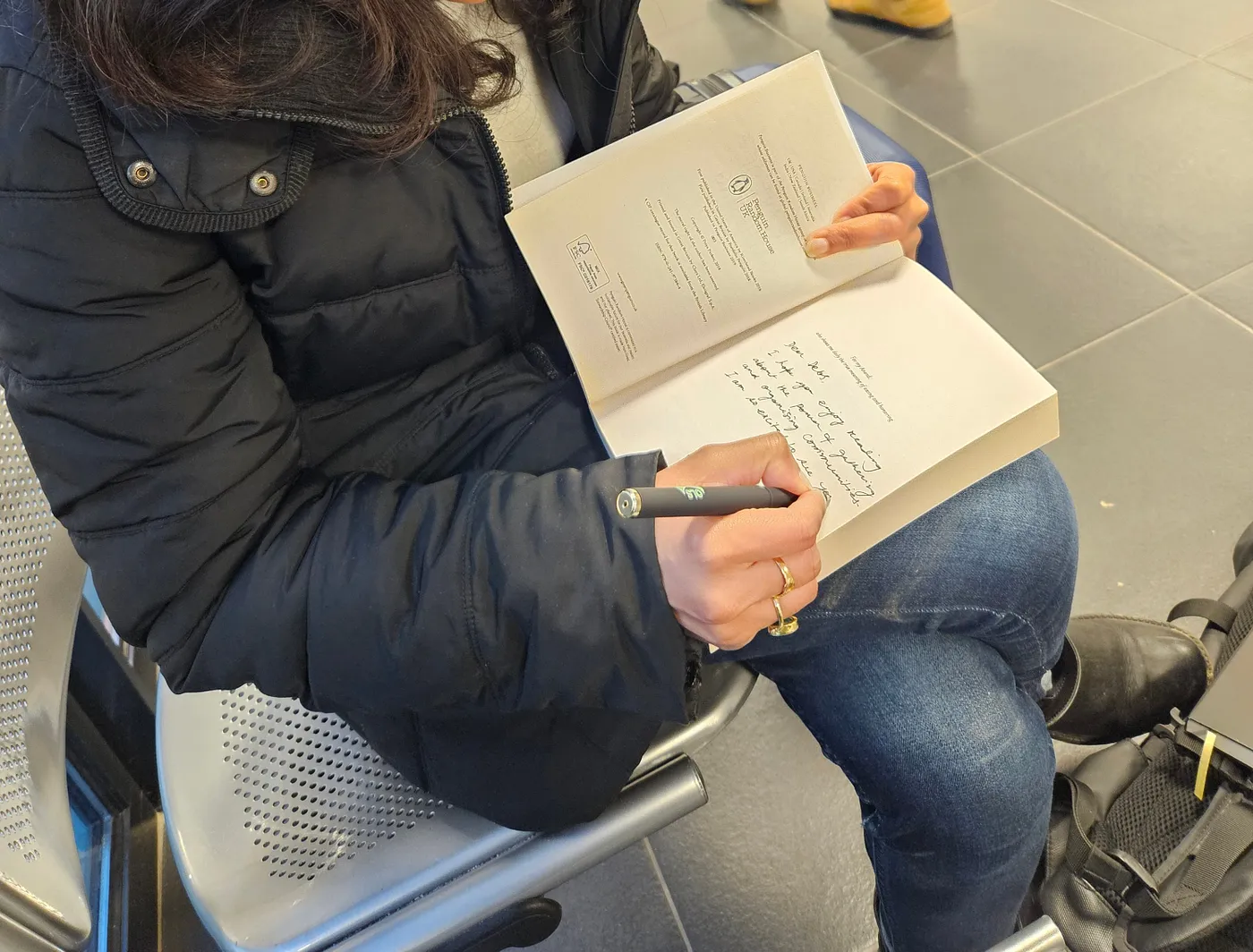
-
Meeting the Open Research Devroom team in person was great too, as they were all welcoming and kind.
-
I finally got to chat with Ruth Ikegah, someone I’ve admired from afar for her efforts to represent Africa in tech.
-
The GitHub Maintainers Afterparty was another highlight — I hung out with Duncan Hall and met Ruth Cheesley, whose calm demeanor was exactly what I needed after two intense days of FOSDEM-ing.
Finally…
I regret not being able to attend CHAOSSCon25, but will try extra hard to be there come 2026 — even though that outcome is not mine to decide.
I also can’t attend the German RSE Conference (25–27th) to present my poster because my visa is only valid until the 21st.
Despite the challenges of getting to FOSDEM’25, it was worth every moment. From speaking and organising to attending brilliant sessions and making meaningful connections, this experience will stay with me for a long time.
Until next time, Brussels! 🧇🇧🇪